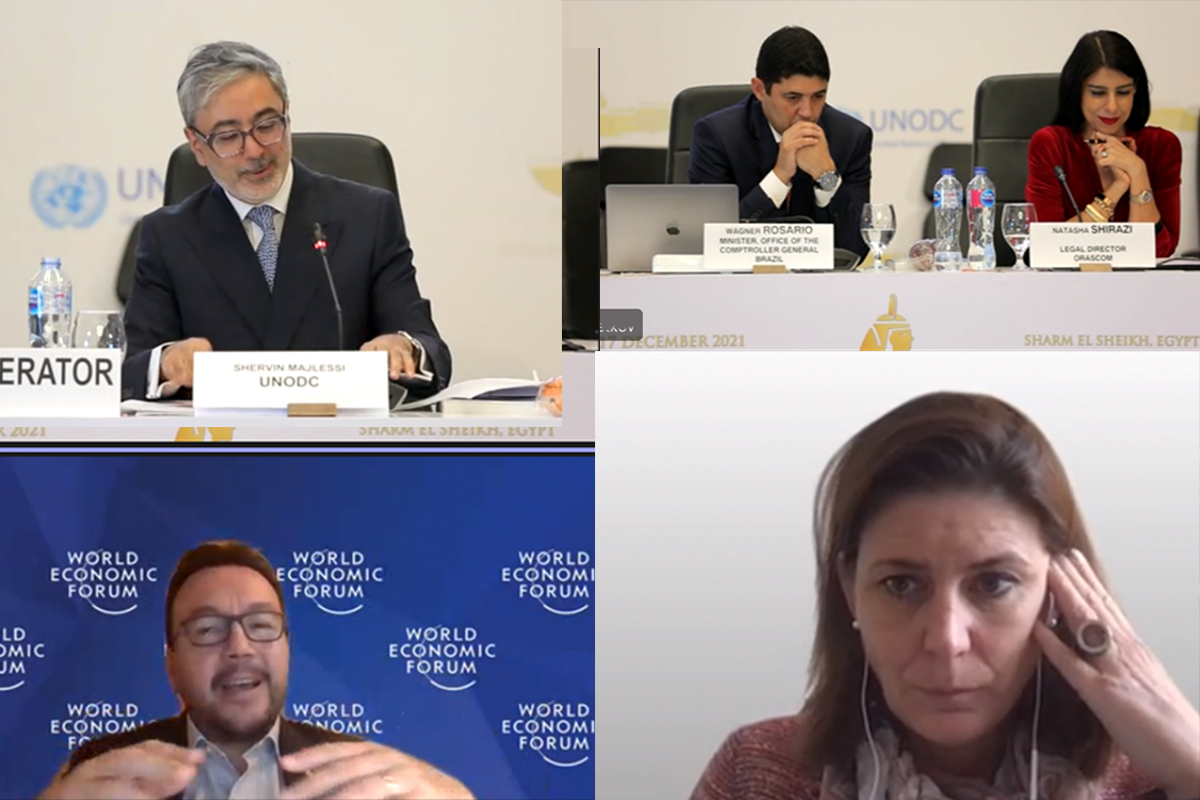Stepping up global action for business integrity – takeaways from a CoSP 9 side event

Key takeaways and perspectives on how to “step up global action for business integrity” from the 9th Conference of the States Parties (CoSP 9) to the United Nations Convention against Corruption at Sharm El Sheikh, Egypt.
The United Nations Office on Drugs and Crime (UNODC), in collaboration with Siemens AG, organised a side event at this year’s Conference of the States Parties to discuss recent trends, challenges and shared experiences on how to strengthen integrity in global business practices.
Held on Tuesday 14 December, the event brought together representatives from a mix of ministries, international organisations, businesses and – moderated by our Managing Director – non-state actors. By gathering together such a diverse group of stakeholders, the event itself illustrated the concept of Collective Action.
Multi-stakeholder approaches to business integrity through Collective Action is something that Siemens AG has been promoting for many years, including through its funding of organisations such as UNODC, our own Collective Action team and many courageous civil society and business organisations around the world.
The benefit of this joined up, collective approach was stressed by all panelists. Opening the event in a pre-recorded video statement, Dr. Andreas C. Hoffmann, General Counsel and Head of Legal and Compliance at Siemens, together with his colleagues Annette Kraus (Chief Compliance Officer) and Sabine Zindera (Head of Collective Action & External Affairs), highlighted the importance of building sustainable Collective Action networks to enable fair market conditions.
This is a message that Siemens lives up to not only by funding projects projects across the globe through the Siemens Integrity Initiative, but also by including Collective Action as a prevention tool in its compliance system.
Mr El-Bagoury, CEO of Siemens Egypt, shared examples of how the company lives up to this in its day-to-day work. It consists of a combination of tangible Collective Action tools – in Egypt in the form of an Integrity Pact between Siemens and its respective business partners – and significant investment in building the capacity of the workforce, partners and intermediaries. Originally developed for a large infrastructure project to build the third-largest powerplant in the world, the model is now being replicated for a big mobility project in Egypt.
Other panelists also highlighted the importance of education and training, within companies but also across society as a whole, in order to significantly shift the business environment towards a culture of integrity. This concept is at the heart of the work presented by UNODC which, over the past years and with support from Siemens, has reached over 7,000 students worldwide. The UNODC programme also makes an important contribution to mainstreaming integrity across all types of businesses, with its Collective Action project providing tailored support and training to small and medium-sized businesses.
This need to reach out to all types of businesses was strongly supported by H.E. Mr. Wagner de Campos Rosário, Minister of the Office of the Comptroller General, Brazil. Sharing some of the lessons learned by the Brazilian government from the Lava Jato/Odebrecht case, he underscored the importance of regulating state-owned enterprises (SOEs) similarly to the rules applicable to privately owned enterprises. He also emphasised the need to invest in the development of SOE compliance systems, as SOEs form an integral part of the business environment in many countries.
The value of constantly reviewing and, if needed, amending the applicable regulatory framework was supported by the representatives from the Egyptian Ministry for Electricity and Renewable Energy. As part of Egypt’s desire to open up the country’s energy sector while also ensuring transparency and fair competition, significant efforts were made to strategically amend and develop relevant laws, reduce red tape by establishing e-platforms, and set up accountability mechanisms.
Ms. Shirazi, Head of Legal at construction company Orascom, the first Egyptian multinational corporation, agreed that a clear regulatory framework is important. This is because when the rules are clear, companies like Orascom can focus on embracing business integrity and compliance as an asset and not a cost. When openly declared and unequivocally supported from the top, ethics and integrity are a protective shield for companies, even in high-risk sectors. These “soft factors” are extremely important, and should also include harnessing business integrity as a currency to build trust with other stakeholders.
Pedro Gomez Pensado, the Head of the World Economic Forum’s (WEF)’s Partnering against Corruption Initiative (PACI), confirmed that he observed similar trends in the WEF community as previous panelists have noted. In particular, he stressed the increased emphasis of the next generation on integrity and broader environmental, social and governance (ESG) topics. Gomez Pensado expects this to have a significant impact on the labour market of tomorrow, where a company’s commitment to integrity is increasingly seen as a decisive factor in employment decisions taken by young entrants to the labour force.
This momentum is likely to be bolstered by a growing recognition that ESG is about more than “just” the environment. Indeed. strong ESG momentum will inevitably shift its emphasis on establishing a culture of integrity as a foundation for all other ESG requirements. New technologies such as artificial intelligence and blockchain bring new opportunities but also potential ethical risks. Companies and governments should get ahead of this development.
Overall, panelists agreed that business integrity was a fast-developing concept, and that rapid progress has been made in recent years.
To wrap up, the panel moderator Gretta Fenner, Managing Director of the Basel Institute on Governance, noted that the discussion was almost a recipe for how business integrity can and will work: through a joined-up effort tackling corruption at every level and from every angle, bringing together culture and laws, spanning the smallest and largest enterprises, uniting competitiveness and integrity, and building on awareness, understanding and trust. Or, in two words: Collective Action.
Find out more about Collective Action for business integrity on the B20 Collective Action Hub.




